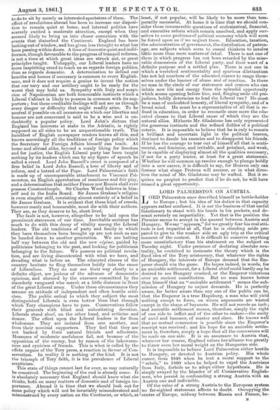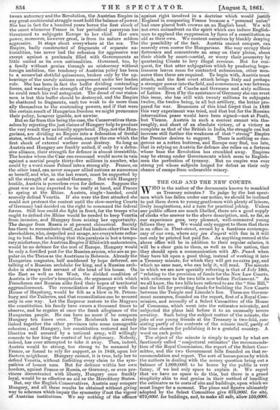LORD PALMERSTON ON AUSTRIA. -FI ORD Palmerston once described himself as
bottle-holder to Europe ; but his idea of his duties in that capacity appears rather confused. It is not the business of that useful functionary to stand with his hands in his pockets, and de- scant serenely on impartiality. Yet that is the position the Premier seems to accept in the quarrel between Austria and Hungary. We say "appears," for we greatly fear his real atti- tude is not impartial at all, that he is standing aside pre- pared to give to the weaker side an ugly trip at the critical moment of the contest. It is difficult to conceive anything more unsatisfactory than his statement on the subject on Tuesday night. Under pretence of declaring absolute neu- trality, he contrived to insinuate the theory which is the fixed idea of the Tory aristocracy, that whatever the rights of Hungary, the interests of Europe demand that the Em- peror should win the game. He hopes indeed, in words, for an amicable settlement, for a Liberal chief could hardly say he desired to see Hungary crushed, or the Emperor victorious over an ancient constitution. But no man knows better than himself that an "amicable settlement" means the sub- mission of Hungary to unjust demands. He is perfectly aware, far better aware than any one of the public can be, that the Emperor is a true Hapsburg, a man who will yield nothing except to force, on whom arguments are wasted except in the shape of bayonets. He will not recede an inch ; and amicable settlement means, therefore, simply the right of one side to inflict and of the other to endure—the amity of anvil and hammer, of master and slave. He knows well that no mutual concession is possible since the Emperor's rescript was received ; and his hope for an amicable settle- ment is, therefore, simply a hope that all the concessions will be made on one side. It is an assurance to Austria that, whatever her course, England values her alliance too greatly to throw even her moral weight on the Hungarian side. It is impossible to believe Lord Palmerston either hostile to Hungary, or devoted to Austrian policy. His whole career, from 1848 when he lent a moral support to the "rebels," to 1860 when he helped to expel the Austrians from Italy, forbids us to adopt either hypothesis. He is simply swayed by the blunder of all Conservative English- men, who persist in confounding a strong Austria with an Austria one and indivisible.
Of the value of a strong Austria to the European system no far-sighted statesman affects to doubt. Occupying the centre of Europe, midway between Russia and France, be- tween autocracy and the Revolution, the Austrian Empire in any great continental struggle must hold the balance of power. She has in fact for a hundred years borne the first shock of the onset whenever France in her periodical paroxysm has threatened to subjugate Europe to her chief. Her own power, moreover, however great, is from its nature seldom aggressive. It stops short everywhere at the sea. The Empire, badly constructed of fragments of separate na- tionalities, has never had the cohesion for aggressive war except against a peninsula filled with Governments as little united as its own nationalities. Governed, too, by a family without genius through an aristocracy without foreign ambition, the tendency of Austrian policy has been to a somewhat slothful quiescence, broken only by the up- hearings of the unruly nations compressed under her leaden rule. She has been in fact the buffer dividing contending forces, and wasting the strength of the general enemy before he could reach his real antagonist. The dread of our states- men is lest this buffer should be destroyed, and the Empire be shattered to fragments, each too weak to do more than ally themselves to the contending powers, and if that were the certain result of Hungarian freedom we might pronounce their policy, however ignoble, not unwise. But so far from this being the case, the Conservatives them- selves by rejecting the just claims of Hungary help to produce the very result they so timidly apprehend. They, not the Hun- garians, are dividing an Empire into a federation of fretful states, without a bond of cohesion, except the one which the first shock of external warfare must destroy. So long as Austria and Hungary are frankly united, if only by a defen- sive alliance, their strength for defence is almost irresistible. The hordes whom the Czar can command would move in vain against a martial people thirty-five millions in number, who could by a word rouse Poland into a strong ally. France, on the other hand, can never conquer allied nations as numerous as herself, and who, in the last resort, must be supported by all the strength of an united Germany. But with Hungary hostile, Austria is powerless even for defence. Suppose the great war so long.expected to be really at hand, and France to spring at the Rhine. Austria, single - handed, could scarcely defend Venetia. If she were the first attacked she could not protract the contest until the slow-moving Courts of Germany had decided on the right to command the federal forces. Still less could she fight in front, for the troops 'rho ought to defend the Rhine would be needed to keep Venetia from invasion, and Hungary from seizing her opportunity. The danger from Russia is at present chimerical. Society has there to reconstitute itself, and find leaders other than the slaveholders, who, despoiled and savage, are everywhere refus- ing to lead. But admitting that this paralysis is but a tempo- rary misfortune, the Austrian Empire if filledwith malcontents, would be no defence for the rest of Europe. Hungary would be only a fortified post for the Russian armies, who are as po- pular on the Theiss as the Austrians in Bohemia. Already the Hungarian magnates, half maddened by hope deferred, are talking of a Russian archduke for king, and a Russian arch- duke is always first servant of the head of his house. On the East as well as the West, the divided condition of Austria is the spoiler's temptation, the argument with which Frenchmen and Russian alike feed their hopes of territorial aggrandizement. The reconciliation of Hungary with the House of Hapsburg, would be felt as a blow in St. Peters- burg and the Tuileries, and that reconciliation can be secured only in one way. Let the Emperor restore to the Magyars the constitution his family have sworn a thousand times to observe, and he regains at once the frank allegiance of the Hungarian people. He can have no more if he conquers Hungary ten times over. The Reichsrath has already linked together the other provinces into some manageable cohesion ; and Hungary, her constitution restored and her liberties well assured by a national army, will willingly concede to her king the control of her diplomacy. Nobody, indeed, has ever attempted to take it away. Then, indeed, Austria would be strong, too strong to be menaced by France, or forced to rely for support, as in 1848, upon her Eastern neighbour. Hungary cannot, it is true, help her to defend Venetia, without forfeiting every claim to the sym- pathies of honest men. But for defence within her own borders, against France or Russia, or Germany, or even pro- vinces discontented with liberty, Hungary once frankly loyal, would be as effective an aid as the Hereditary States. But, say the English Conservatives, Austria may conquer Hungary, and all these results be obtained without giving way to schemes which impair the symmetry if not the vigour of Austrian institutions. We say nothing of the offence against right involved in a doctrine which would justify England in conquering France because a "personal union" had once placed both crowns on an English head. We will not even animadvert on the spirit which can induce English- men to applaud the suppression by force of a constitution as old as their own. We content ourselves by blankly denying the possibility of the fact. Austria cannot conquer, can scarcely even coerce the Hungarians. She may occupy their fortresses and concentrate an army on their plains, shoot their chiefs by court-martial, or worry their peasantry by quartering Croats to levy illegal revenue. But for con- quest, for that utter subjugation which by producing hope- lessness leaves room for contented submission, other mea- sures than these are required. To begin with, Austria must attack, and the first overt attack brings Italy and perhaps a stronger power into the field, and commences a war between twenty millions of Czechs and Germans and sixty millions of Latins. Even if by the assistance of Germany she can avert this issue, she has still with twenty millions to subjugate twelve, the twelve being, in all but artillery, the better pre- pared for war. Reasoners of this kind forget that in 1848 this very experiment was tried, and that but for the Russian intervention peace would have been signed—not at Pesth, but Vienna. Austria in such a contest cannot win tho- roughly, and short of an absolute victory, of a victory as complete as that of the British in India, the struggle can but increase still further the weakness of that "strong" Empire the Premier desires to support. There is nothing so dan- gerous as a rotten buttress, and Europe may find, too late, that in relying on Austria for defence she relies on a fortress whose base the Revolution has crumbled away. Empires may be strong under Governments which seem to English- men the perfection of tyranny. But no empire was ever strong yet whose subjects longed for defeat as their only chance of escape from unbearable misery.































 Previous page
Previous page